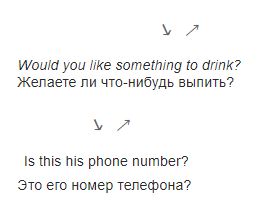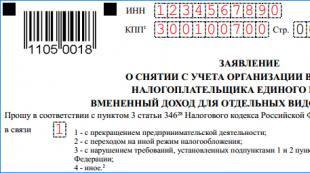Ask all questions to the sentence in English. How to ask a general question in English? Examples
There are 5 types of questions in English:
1. General question
2. Dividing question
3. Special question
4. Alternative question (question with "OR")
5. Question to the subject (question with the word WHO / WHAT)

For the correct construction of an interrogative sentence in English, it is always very important to remember the word order in such a sentence. It may differ significantly from the one used in a similar sentence in Russian.
word order in an interrogative sentence in English

1. General question

A general question is a question that assumes either YES or NO as an answer, in other words, a question for obtaining general information.
This type of question does not use interrogative words and begins with an auxiliary verb. Each tense has its own auxiliary verbs.
Present Simple - DO/DOES
Present Continuous - AM/IS/ARE
Future Simple - WILL / SHALL
Past Simple - DID
Present Perfect - HAVE/HAS
The word order in this type of interrogative sentences is as follows:
1. Aux. verb - 2. Subject (who / what) - 3. Semantic verb (in the right form) - 4. Addition and definition
Do you play tennis every week? - Yes, I do / No, I don't.
Is he a good driver? - Yes, he is / No, he isn't.
Will we go to the restaurant tonight? - Yes, we will / No, we won't.
Did she go to the club yesterday? - Yes, she did / No, she didn't.
Have you ever visited the United States? - Yes, I have / No, I haven't.
2. Dividing question

A separating question is a question that consists of 2 parts separated by a comma.
Part I - statement
Part II - a question to this statement, the so-called "QuestionsTag" ("tail").
Translated into Russian, this second part will sound: "isn't it?" or "Really?" In Russian, we also have questions of this type: "Beautiful weather, isn't it?"
This type of question often expresses sarcasm, the speaker's surprise, or a desire to be confirmed.
How are questions asked in English?
The first part of the question looks like a normal declarative sentence:
- Negative (Anna can't swim fast - Anna can't swim)
- Positive (You will cross the street at the green light - You will cross the road to the green light).
"Tail" acts as a short question. It is he who shows the doubts of the speaker.
The second component is subject to change. It is built in accordance with the way the first part was formulated.
If the first part was negative, the "tail" contains a positive statement. Conversely, with a positive main component, the second part will be negative.
- Anna cannot play the guitar, can she? Anna can't play the guitar, can she?
- Tom is leaving tomorrow, isn't he? Laura is leaving tomorrow, isn't she?
The second part of the tag question in English has two components:
- 1) The person in question, used in the first part. It can be a pronoun or a proper name.
- 2) Modal verb, verb to be or auxiliary verb. As mentioned above, in this case, focus on the first part.
It should be considered how such structures are compiled.
The main difficulty here is that it is necessary to know the times in order not to make mistakes in constructing the second part of the question.
For an affirmative construction, the rule has the following scheme
Statement + Auxiliary Verb + Particle not + Actor?
For example,
- Jack studies English. Jack is studying English.
The first thing to start with is timing. In this example, it is Present Simple. Accordingly, the auxiliary verb for the 3rd person singular would be "does".
Since there is a statement in the first part of the example, "not" should be added to the "tail".
The person in question does not change in any way.
As a result, we get that the dividing question looks like this:
- Jack studies English, doesn't he? Jack is studying English, isn't he?
The table below shows examples of these constructions for simple times.
Scheme of the formation of a negative design
Negative + Auxiliary Verb + Actor?
In this case, we remove the particle not in the second part and use the same verb that was in the first part. The acting person does not change.
For example:
- She doesn't drink coffee. She doesn't drink coffee.
In the second part of the construction, only the verb does should be taken. As a result, we have:
- She doesn't drink coffee, does she? She doesn't drink coffee, does she?
Building a question with a modal verb.
If present in the design modal verb, auxiliary is not applied.
For affirmative questions, the scheme looks like this:
Statement + Modal Verb + Particle not + Actor?
"Tail" in this case contains the same modal verb, but with the particle not.
For example:
- She can run fast. She can run fast.
The split question will look like:
- She can run fast, can't she? She can run fast, can't she?
For negation:
Negative + Modal Verb + Actor?
For example:
- She should not go alone. She shouldn't go alone.
Using the diagrams, we get:
- Should she not go alone, should she? She shouldn't go alone, should she?
Building a question with "to be"
Statement + Verb to be + Particle not + Actor?
In the "tail" the verb to be is placed in the same tense in which it exists in the first part, only with the addition of the particle not.
For example:
- Samantha is a PR Manager. – Samantha is a PR manager.
Using the diagram, it turns out:
- Samantha is a PR Manager, isn't she? – Samantha is a PR manager, isn't she?
For a negative design, the scheme looks like:
Negation + Verb to be + Actor?
The second part of the question is composed using the verb to be and the actor from the first part.
For example:
- Miranda and Jeremy were not embarrassed? Miranda and Jeremy weren't embarrassed.
Using the diagram, we get:
- Miranda and Jeremy were not embarrassed, were they? Miranda and Jeremy weren't embarrassed, were they?
Traps in English language when building questions with a Question Tag
If there is a possessive pronoun in the first part (for example, his son), in the "tail" it is changed to a short one (using the example above, we get "he").
After the words everyone (everyone), someone (someone), anyone (someone) in the second part, they are used. For example, Someone can do it, can't they? “Someone can do it, right?
If “I am” occurs in the first part of the affirmative construction, am is changed to are in the “tail” and the particle not is added. For example, I am right, aren't I? - Am I right?
Some words in English carry the meaning of negation (hardly - hardly, barely - barely, nothing - nothing, nobody - nobody, etc.). Using them in the first part of the affirmative construction, we get negations, so in this case, the not particle is not added to the second part. For example, They have nowhere to go, do they? They have nowhere to go, do they?
In order to correctly compose disjunctive questions with a tail, it should be remembered that if the first part of the construction is affirmative, a negation should be added to the second part and, conversely, if the first part is negative, the second is positive.
Question tags table
|
Main part |
Examples |
|
| am | aren't | I am right, aren't I? |
|
I am not tall, am I? |
||
|
Greg is here, isn't he? |
||
|
Kids are at home, aren't they? |
||
|
Greg isn't here, is he? |
||
|
are not/aren't |
Kids aren't at home, are they? |
|
|
Greg was here, wasn't he? |
||
|
Kids were at home, weren't they? |
||
|
was not/wasn't |
Greg wasn't here, was he? |
|
|
were not /weren't |
Kids weren't at home, were they? |
|
|
I have played chess, haven't I? |
||
|
Paul has played chess, hasn't he? |
||
|
have not/haven't |
I haven't played chess, have I? |
|
|
has not/hasn't |
Paul hasn't played chess, has he? |
|
|
I had played chess, hadn't I? |
||
|
Paul hadn't played chess, had he? |
||
|
Molly will phone us, won't she? |
||
|
Greg won't phone us, will he? |
||
|
We shall arrive soon, shan't we? |
||
|
shall not / Shan't |
We shan't arrive soon, shall we? |
|
|
It would be possible, wouldn't it? |
||
|
would not/wouldn't |
He wouldn't come, would he? |
|
|
Molly can swim, can't she? |
||
|
can't/can't |
You cannot do this, can you? |
|
|
Molly could swim, couldn't she? |
||
|
could not / couldn't |
You couldn't do that, could you? |
|
|
I may be free, may not I? |
||
|
may not / may not |
I may not write here, may I? |
|
|
It might be true, mightn't it? |
||
|
might not /mightn't |
It mightn't be so late, might it? |
|
|
You must keep calm, mustn't you? |
||
|
You mustn't panic, must you? |
||
|
You should eat less, shouldn't you? |
||
|
should not /shouldn't |
You shouldn't eat cakes, should you? |
|
|
does not / doesn't |
Greg doesn't like Jim, does he? |
|
|
We don't like Greg, do we? |
||
|
did not / didn't |
Molly didn't come, did she? |
3. Special question

This question is used to get additional information. Therefore, it always begins with a question word. Are special questions often called "wh-questions"? Why? It's simple - interrogative words in such questions most often begin with the letters wh. Hence the name.
| 10 question words in English | ||
| Word | Transcription | Translation |
| who? | who? | |
| whom? | whom? | |
| whose? | whose? | |
| what? | what? which? | |
| which? | [wɪtʃ] | which the? |
| where? | [weə(r)] | where? |
| when? | when? | |
| why? | why? | |
| how? | as? | |
| how many/much? | ||
Sample questions:
Who is this man? - Who is this man?
whom are you going to invite? - Who are you going to invite?
Whose camera is this? - Whose camera is this?
What is your hobby? - What is your hobby?
Which car is yours, the red or the blue one? - Which car is yours, red or blue?
Where does jill live? - Where does Jill live?
When do you have to leave? - When do you have to leave?
why do you look so sad? - Why do you look so sad?
how are you today? - How are you feeling today?
How many dressed has she got? - How many dresses does she have?
Special issues and education scheme - basic rules
Special questions in English have a similar structure to that of general questions. First important rule Modal or auxiliary verbs are placed before the subject. The second important rule is that the interrogative word is placed before the modal or auxiliary verb.
Special Question Schema

- The first place in the word order belongs to the question word.
- The second place is occupied by modal (should, ought, may, must, can) or auxiliary (do, does, did, will, have, had) verbs.
- If to have and to be act as semantic verbs, then they play the role of auxiliary and are brought forward of the subject.
- What are you reading? => What are you reading?
- What car do we need to get to that place? => What car do we need to get to this place?
- Where was he on Monday? => Where was he on Monday?
- What do you need to write this article? => What do you need in order to write this article?
- Who(m) does she want to congratulate? => Who does she want to congratulate?
- Which trousers would you like to wear? => What pants do you want to wear?
- What are they laughing at? => What are they laughing at?
- What are you talking about? => What are you talking about?
- What are you thinking of? => What are you thinking about?
- Who is she talking to? => Who is she talking to?
It is worth noting that in questions starting with Who, What, Where, Which, the prepositions to, from, with and others are usually put at the end:
- Where is she coming from? => Where is she from?
- Where is he driving to? => Where is he going?
- Which direction are you traveling? => In which direction are you going?
- What city does she live in? => What city does she live in?
- What time is it? => What time is it now?
- Whose pencil is this? => Whose pencil is this?
- What is your name? - What is your name? => My name is Angelina White. My name is Angelina White.
- Who is that guy? - Who is that guy? (information about the degree of relationship, surname, etc.) => He is my brother's best friend. He is my brother's best friend.
- What is he? => Who is he by profession? (in English - information about the occupation, specialty).
- How much is it? => How much does it cost?
Howcorrectly formulate answers to special questions
If we compare special questions with general ones, then the first ones need an explanatory answer. It may be a complete or incomplete sentence. In order to correctly compose the answer, we will explain with examples:
- When is he going to leave? - Today. => When is he leaving? - Today.
- When is he going to leave? - He still didn't decide. => When is he leaving? He still hasn't decided.
- What is the matter with them? - They suffer from toothache. => What's wrong with them? - They suffer from toothache.
- What is the matter with them? – Nothing. => What's wrong with them? - Nothing.
- How do you like my new shirt? - Oh, it's awful! => How do you like my new shirt? - Oh, she's disgusting!
- Where is my sister's seat? - Row 13, seat 13. Your sister is lucky one. => Where is my sister's place? - 13th row, 13th place. Your sister is lucky.
- When will you send a letter? - In a week. => When will you send the letter? - A week later.
Let us give examples of special questions, where the interrogative word acts as different members of the sentence.
Interrogative words play the role of direct objects or definitions for the object
On a note! In modern English, the who form is more popular than whom. By choosing whom, the person makes the question more formal. This form would be appropriate for use in business language.
Interrogative words play the role of prepositional objects or definitions for prepositional objects
It is important to note that such proposals are somewhat different from others. They put the preposition at the end of the sentence.
More examples of special questions:
It must be remembered that the answer can consist of one or more words. This word refers to the part of the sentence to which the question referred:
4. Alternative question

As the title suggests, this question asks you to make a choice.
There are often circumstances in life when you need to make a choice or offer it to others. This function is performed precisely by alternative questions. An alternative question in English means questions that offer a choice from two or more actions, qualities, objects, etc.
Of course, the answers ‘’yes’’/’’no’’, which are unambiguous, in a situation with alternative questions are unacceptable in meaning.
Examples of using alternative questions in English
A few examples to better understand the rule when you need to ask an alternative question:
- Will you propose me coffee or tea? => Will you offer me coffee or tea?
- Are you going to Africa or Brazil? => Are you going to Africa or Brazil?
- Is he wearing his or mine trousers? => Is he wearing his pants or mine?
As you can see from the examples, all that is needed for an answer is simply to choose one of the options already offered.
As for intonation, it should be given considerable attention. You can not pronounce alternative questions in one continuous intonation. The first part of the question, before the particle or, is pronounced in a slightly high tone, the second - understated. It can be concluded that the first option is more preferred than the second, but this is not always the case. It all depends on the situation and on the preferences of the respondent.
- Do you prefer pineapples or peaches? => Do you prefer pineapples or peaches?
- Do you like listening to music or watching TV? => Do you like listening to music or watching TV?
- Is he handsome or just pretty? => Is he handsome or just cute?
As you can see, the answer in favor of a particular quality/thing/object depends on personal taste preferences and individual wishes. For example, for one, peaches will be tastier, for another, pineapples. It cannot be said that one is better and the other is worse. The same can be said about music. Someone likes to relax with their favorite songs, for someone watching a movie is the best entertainment. And as for sympathy, it is purely individual preferences.
Features of the formation of the construction of alternative questions
To build a construction, it is common to use inversion, that is, a change in the order of words in a sentence. The presence of inversion is observed in all types of questions, except for a special one (to its definition and subject). How is the proposal constructed in such cases? In the first place we put (one to choose from):
- modal verb;
- auxiliary;
- question word.
One option is selected. It depends on the nature of the offer. What is important is the presence of the union or, with the help of which a choice of several proposed options is provided. To better understand the structure of the construction, we will clearly demonstrate how an alternative question is formed according to the principle of general questions.
Usage examples
We take two general questions and connect them with the union or:
- Are they knitting or are they sewing? => Do they knit or sew?
- Is she going to school or is she going to cinema? => Does she go to school or to the movies?
- Does he solve a problem or does he watch TV? =>
Now, to form a correct alternative question, we remove the second part of the question, which is repeated, and leave only its alternative. This results in the following suggestions:
- Are they knitting or sewing? => Do they knit or sew?
- Is she going to school or to cinema? => Does she go to school or to the movies?
- Does he solve a problem or watch TV? => Is he solving a problem or watching TV?
In other words, an alternative question in English is formed on the basis of general questions, which serve as a kind of foundation for the formation of alternative questions. The main task is to connect several alternative options, among which one is a possible answer.
The second part of the alternative question in some cases can be replaced by a negative particle not . Here are some examples:
- Will she be so kind to repeat or not? => Will she be so kind to repeat or not?
- Is he waiting for me or not? => Is he waiting for me or not?
- Do you like my cookies or not? => Did you like my cookies or not?
- Did they trust us or not? => Did they trust us or not?
Important! An alternative question should be answered only with a full sentence.
Alternative question in English in relation to the subject
It is important to remember that in the case when an alternative question must be asked to the subject, then the second part of the question must also have a modal or auxiliary verb, which must precede the second subject. And it is worth remembering that the answers to such questions most often have a short form.
If an alternative question consists of a special question (special questions have their own specifics of education), followed by homogeneous members of the sentence, then you need to use an interrogative word. It is placed at the beginning of such a sentence.
Examples:
5. Question to the subject

If we want to ask a question to the subject (who? what?), then we use this type of question.
As you may have guessed, the question will begin with the word WHO or WHAT.
The peculiarity of this type of questions is word order. We use the same word order as in the statement. At the same time, who (what) is conditionally in the 3rd person singular. Those. mentally replace it with he. Who Question or Question to the subject - a question that does not require an auxiliary verb. This type is formed by the interrogative words who (who) and what (what).
You need to compose questions to the subject in the following way:
To make it easier to figure out how to ask this question, it is enough to come up with an affirmative sentence and replace the subject with an interrogative word in it. Since interrogative words imply 3rd person, singular, remember to attach the -s ending to verbs and use the appropriate form of the verb to be (is and was).
In the examples below, we simply change the subject to the question word, but we need to pay attention to what happens to the verb. The form of the verb changes.
The verb "to be"
I am busy. - I'm busy.
Who is busy? - Who's busy?
Our children were at home. Our children were at home.
Who was at home? - Who was at home?
We will be
tired. - We'll be tired.
Who will be tired? - Who will be tired?
The verb "to have"
They have a lot of cats. - They have a lot of cats.
Who has a lot of cats? - Who has a lot of cats?
Our children have been in the zoo. Our children have been to the zoo.
Who has been in the zoo? - Who has been to the zoo?
By the 1 May, I will have been working at the university for five years. - By May 1, I will have been working at the university for 5 years.
Who will have been working at the university for five years by the 1 May? - Who will have been working at the university for 5 years by May 1?
The verb "to do"
They do their room often. - They clean their room often.
Who does the room often? - Who cleans his room often.
They don't play. - They don't play.
Who doesn't play? - Who doesn't play?
Other semantic verbs:
We sing every evening. - We sing every evening.
Who sings every evening? - Who sings every evening?
but:
We will
play with you. - We'll play with you.
Who will
play with you? - Who will play with you?
As you know, a question is a request for information or an action. Every day we ask ourselves and others many different types of questions (Who am I? Why did I come into this world? Who is the cutest in the world? How to learn English in a month? ..). The questions are different, but formally they are united by one common feature(or rather, a sign): at the end of each interrogative sentence there is always a question mark.
So, let's see what types of questions are in English.
Closed questions
Closed questions are those types of questions that require a yes/no, true/false answer.
Auxiliary verbs are used for this type of questions in English ( do/does, am/is/are, have/has). The auxiliary verb is placed at the beginning of the sentence. Thus, the predicate and the subject are reversed.
| Statement | Question |
| He is from London. — He is from London. | Is he from London? — Is he from London? |
Formation of questions in Present Continuous
Discuss this topic at Skyeng School
first lesson free
Submit your application
42585
In contact with
If in the process of learning English you still do not understand how to ask questions, now we will fix this problem.
So, for starters, you should remember that in English there are only 5 types of questions. We begin to bend our fingers:
- The first type of question is general
Do you like traveling?- Do you like to travel?
As mentioned above, the answer can either Yes, I do, or No, I don't.
In order to construct a general question, it is necessary to think of an affirmative sentence, which in this case would sound like this:
You like travelling.- Do you like to travel.
When adding an auxiliary verb, which is placed at the very beginning of the sentence, a general question is formed. Every English tense has its own auxiliary verb.
I draw your attention to the fact that in Present Simple for verbs of the 3rd person singular, the auxiliary verb will be does:
Does she like traveling?- She loves to travel?
Yes, she does.- Yes
Did the weather smile on you? Was the weather favorable to you?
Yes, it did. It was a fine day. Yes, it was a wonderful day.
- The second type of question is
It is called so because it starts with special :
What?- Who? What? Which?
Who?- Who?
When?- When?
Where?- Where? Where?
Why?- Why?
Which?- Which the? Which?
Whose?- Whose?
Whom?- Whom?
how?- How?
how long?- How long?
How often?- How often?
How much?- How?
How many?- How?
The main difference between a special question and a general question is precisely the interrogative word at the beginning of the sentence. Everything else is a general question. Let's look at an example:
Did she tell the truth? Did she tell the truth? (general question)
Why did she tell the truth? Why did she tell the truth? (special question)
Did the plane landtake off? The plane has landed? (general question)
When did the plane land?- When did the plane land? (special question)

- The third type of question is an alternative
Here you can choose only one answer from the two alternatives provided.
Do you prefer tennis or football? Do you prefer tennis or football?
I draw your attention to the fact that if you drop the auxiliary verb at the beginning of the sentence and the alternative at the end, you get an affirmative sentence.
Would you like mashed potatoes or spaghetti? Would you like mashed potatoes or spaghetti?
Did you live in Russia or in the Ukraine?– Did you live in Russia or Ukraine?

- The fourth type of question is a disjunctive
Used to validate one's own thoughts and suggestions. It is constructed as an affirmative sentence, at the end of which a comma and an auxiliary verb are added in a negative or affirmative form, depending on the first part of the sentence.
She is a good teacher, isn't she? She's a good teacher, isn't she?
He plays the violin, doesn't he? He plays the violin, doesn't he?

- The fifth type of question is a question to the subject
Such a sentence begins with a question word, the word order does not change.
Who came to the pajamas party? Who came to the pajama party?
What happened at the end?- What happened at the end?
Who feels tired? Who is feeling tired? (Note that the ending ‘s’ is added to the verb, since the action takes place in the Present Simple).

2015-10-30
Greetings, dear friends and readers of my blog!
Do you know why the heroes of the story "The Right Question" by Robert Sheckley never managed to get a single sensible answer from the omniscient Answerer? … They just failed to ask the right question!
To prevent something like this from happening to you when communicating with an English-speaking interlocutor, in this article we will analyze questions for a conversation in English. Consider, study the word order and the behavior of verbs in them, pay attention to some nuances. All this will be supported by numerous examples. In addition, we will look at a list of the most common questions in conversations.
To ask a question in Russian, just change the intonation. Speaking in English, in order to build interrogative sentences, it is also necessary to observe a certain word order.
Basic principles of construction
And yet, how to make sentences so that they have an interrogative sound?
Let's remember the most important:
- Question words or pronouns (if they are present in the question) - are placed before the whole sentence (What, Which, When, etc.)
- Predicate, modal or auxiliary verb in the appropriate tense and person (But if item 1 is missing, this verb will be at the very beginning!)
a) If the predicate is expressed by the verb to be or to have in the present or past tense, they are placed before the subject
Have you got a book?- Do you have a book?
Do you have a book? - American version.
Were you in London yesterday?- Were you in London yesterday?
b) If the predicate is expressed by the turnover there is, the verb to be is placed before the word there, and the subject after it:
Is there any fish in the freezer?- Is there fish in the freezer?
in) An auxiliary or modal verb is placed before the subject if the latter is part of the predicate:
Can you give me your pen?- Can you give me your pen?
Have you heard the noise?- Did you hear that noise?G) In other cases, the auxiliary verb Do (Does) in the present or Did in the past tense is placed before the subject.
Does he work in an office?- He is working in the office? (Note that the -s has gone into the auxiliary verb) - Yes, he works in an office.
e) If the predicate contains two or three auxiliary verbs, then the first auxiliary verb is placed before the subject (as is the case in Present Perfect Continuous and Past Perfect Continuous):
Has she been working in our firm for ten years? Has she been with our firm for ten years?
e) Remember that the verbs to be and to have can be both auxiliary and modal (to have to, to be to)
Let me remind you that in the future tense the auxiliary verb is will/shall.
- Subject (If the subject is a question word, you can start here!)
- semantic verb(If there is a modal or auxiliary verb in the question, it is put in the present tense and 1st person)
- Addition (him, her... - often answer the question "to whom")
- Circumstance of place(in the theatre)
- circumstance of time(at 6 o "clock)
Types of interrogative sentences
And now I will name the characteristic details of each type and give examples:
- General issues Those are the ones that can be answered "yes" or "no". They are also called “Yes/No questions” (you can learn more about this type from).
Do you like green tea?
Are you a banker?
Do you have a car?
- Special questions - are built on the basis of the structure of a general question with an interrogative word. Ask them when you need to know the details: How? What for? When?
When do you take your dog for a walk?
Where do you go every day?Here is a list of question words with translation:
who - who
what - what, what
when - when
where - where, where, from where
how - how
how long - how long
which - which
whose - whose
how much / how many - how much
why - why
- Alternative questions - offer a choice between two possible options for something (circumstances, things or people). Have you guessed why they have an “or” particle in their composition?
Are you a student or a pupil?
Do you want tea or coffee?
- Separation questions (with a ponytail) - end with the question "isn't it?". Moreover, if the first part of these questions is narrative, then the short second (tail) will be negative and vice versa.
Tom likes green tea, doesn't he? Tom likes green tea, doesn't he? (is not it?)
Tom doesn't like cacao, does he? Tom doesn't like cocoa, does he? (is not it?)A special group of questions "questions to the subject" - after all, in them the word order remains direct, that is, as in a declarative sentence, and the role of the subject goes to the interrogative word. Note that this feature applies only to the past and present tenses.
Who wants to eat nuggets?
What makes you happy?
Who knocked at the door?As you noticed from the examples, in the present tense the semantic verb is put in the singular form of the third person, therefore it will always have the ending “s (es)”, and in - the form of the verb will always be the second!
indirect questions - are formed using the expression “I wonder” (and some more ...).
I wonder if he smokes.“I wonder if he smokes?”
He wonders if she wanted to go there. He wonders if she wanted to go there.Have you noticed that the word “if” , which plays the role of the “whether” particle, does not take a very good place for literal translation?
More details about different types questions in English you can find out by clicking on the appropriate links:
Standard set
If you regularly have conversations on various topics with your acquaintances in English, then for greater ease of communication, you should have an arsenal of frequently asked questions:
How are you?- How are you doing?
How do you do?- How are you?
Do you agree?- Do you agree?
Could (Can) you help me?- Could you (could) help me?
Really?- Right? Truth?
Do you understand me?- Do you understand me?
What for?- For what?
How can I get to ...?– How can I get to …?
Do you know that...? - Do you know that …?When meeting, the following questions will come in handy:
What's your name?- What is your name?
Where are you from?- Where are you from?
Is this your first time here?- Is this your first time here?
Who are you? - Who you are?
What are you?- Who you are? (When we want to know what the interlocutor does or who he is by profession)
Where do you live?– Where do you live?
Where are you staying?— Where did you stay?
How are you doing? - How are you?Note to students
It is also necessary to note a group of questions for schoolchildren
(about study, about summer, about classmates):Are you a pupil?- You are a student?
Does Tom have a pen? Does Tom have a pen?
May I take your eraser?– May I have your eraser?
Is the book exciting? Is the book exciting?
Are you at school?- Are you in school?
Are you going to school on Monday?– Do you go to school on Monday?
Do you study well?– Are you a good student?
How many pupils are there in your class?- How many students are in your class?
How did you spend the summer?- How did you spend your summer?
What is your favorite subject?- What is your favorite subject?
What do you usually do at your free time?– What do you usually do in your free time?
Why do you like holidays? Why do you like holidays?
Did you do your homework with your father?- you did homework with Father?
Who teaches you English? - Who teaches you English?For lovers of nuance
How to ask disjunctive questions (with a tail)?
a) If the first part is expressed as a request in the imperative mood, then in the second it will be: can you / could you or will you / won't you.
Wait a minute, can you?- Wait a minute, ok? (Good?)
b) Imperative sentences that begin with the phrase "Don't" give a tail - "will you".
Don't forget to come, will you?- Don't forget to come! Will you come? (Good?)
in) If the sentence starts with "Let's", then it ends with "shall we".
Let's talk, shall we?- Let's talk, okay?
G) If the subject is "that" or "this", then they are replaced with "it" at the end.
That is your car over there, isn't it?- That's your car, isn't it?
But “I am” changes to “aren’t I”, no matter how embarrassing you are.
I am a good pupil, aren't I?"I'm a good student, aren't I?" (Yes?)
Here are a couple more interesting examples:
a) In English, unlike Russian, when we answer yes to a negative question, we never say "No", but only "Yes":
Haven't you seen Jack? -Yes, I have. - Haven't you seen Jack? - No, I saw it.
Didn't you meet him yesterday? - Yes, I did.- Didn't you meet him yesterday? - No, I met.b) If you need to express surprise about something in a negative form (in Russian, such sentences begin with the words “is it?” or “Really?”), Then you need to do it like this:
Don't you want to come to our place tomorrow?- Don't you want to come to us tomorrow?
Didn't you hear about that?"Haven't you heard about it?"Some differences between the informal versions
I think each of you understands that our everyday speech does not always comply with all grammatical rules: it is characterized by various abbreviations, omissions of words (omission), changes in the form of pronouns, etc. This also applies to English.
Here are some typical differences:
Have you done that? - Don't that?- You did it?
Who was the boy whom she asked? Who was the boy she asked?(omission of conjunction “whom”)
Do you think that we should go there? – Do you think we should go there?(omitting the conjunction “that”)
Or when asked again: He is a famous racer - Is he?(contrary to the rules - the tail is not negative here!)Well, we've reached the finish line! , my dear! Try to think in English sometimes, pay a little attention to the language every day, and you will succeed!
Now forget about all the complicated terms and definitions! Get down to practical and interesting questions in English.
See you soon! If you liked this article and turned out to be relevant, advise your friends to read it on social networks.
In contact with
Any questions?
Any questions?Of course, you have questions: English sometimes sets tasks. For example, how to write questions in English? What are the types of questions? How to ask a question with the correct intonation so that native speakers do not have to guess whether this is a question or not?
So, 5 types of questions in English:
General questions, or yes/no questions
Special questions, or WH questions
Alternative questions
Separating questions, or tag questions
Questions to the subjectLet's take a closer look at all types of questions with examples.
General issues- these are questions that can be answered either yes or no (you can still answer “I don’t know”, but this is not about us).
Do you like opera? - No, I don't.
Do you love opera? - No I do not like.
Are you a football player? - Yes, I am.
Are you a football player? - Yes.General questions always begin with a verb. It can be one of the auxiliary verbs (be, do, have), it can be the verb to be (to be, to be) in its direct meaning, or maybe modal.
How to ask a YES/NO question with the verb to be
The formation of questions in English becomes possible due to a change in the structure of the sentence. If you know the most elementary sentence structure in English (subject-predicate-object) - you can ask such a question. Just swap the subject and verb.
See how the place of the verb to be changes in the question:
Note that nothing changes in the Russian translation - we are used to denoting a question with intonation, and inversions- changing the order of words in a sentence - we do not have, or is rare.
How to ask such a question in English using the verb to do
In addition to to be, any other verb can be in the sentence:
The fish swims in the ocean - Fish swimming in the ocean My friends play football - My friends play football I sing opera - I sing opera
And then you need to use the helper verb DO
Does the fish swim in the ocean?
Do my friends play football?
Do I sing opera?There is no word with such a function in Russian. We simply say: Do fish swim in the ocean? It is worth replacing the question mark with a period, as the meaning changes radically. Comfortable? May be. But treat the helper do condescendingly. He tries his best. See how he took away from the verb swim ending -s? This is to make it immediately clear to you and me that we are talking about a single fish. And in general, it's like a beacon: you hear do at the beginning of a sentence - wait for a general question.
So we put the verb do at the beginning of the sentence before the subject, and the general question is ready. You just need to choose the correct form according to the date and time.
If the semantic verb is also do (to do), then the auxiliary will still be do. You get two do words in one phrase:
Does she do her homework? - Does she do her homework?
Once again, note that the auxiliary verb do has changed in accordance with the feminine gender - it has become does, while the semantic one remained in its initial form.
How to ask questions in English with modal verbs
I have the opportunity to buy a goat. But I have no desire.
(from the film "Prisoner of the Caucasus")Modal verbs are verbs that express our desires and possibilities. These are the verbs can, may, must, should and others. We ask questions with them using inversion, i.e. Swap subject and verb.
+
You can buy a goat.
You can buy a goat.?
Can you buy a goat?
Can you buy a goat?Also, modal verbs are very often used when asking a direct question is not very polite.
could you pass me the salt? - Could you pass me the salt?
Would you do me a favor? - Could you do me a favor?
May I come in? - May I come in?
Should I wait here? - Do I need to wait?How to answer a general question?
As you know, sometimes you can get an answer to a question, and here it is important not to get confused and understand it. Most often, at first it will be the usual short answer, and after it the details may already follow.
Yes, I do, or:
No, I don't.Or:
Yes, it is
Yes, I canWhich verb will be used in the answer depends on the question. If the question contained an auxiliary do, then the answer will also contain do. If you were asked:
Did you go to the supermarket yesterday? - Did you go to the supermarket yesterday?
Need an answer
- Yes, I did, or
- No I didn't
As a last resort,
- I don't remember
- I don't rememberBut don't make this mistake:
- Did you go to the supermarket yesterday?
Do not answer
- No, I wasn't.It is necessary that your verbs coincide with the interlocutor, then you will have complete linguistic harmony and understanding.
Why all these short answers? So faster and more convenient. Instead of saying "Yes, I went to the supermarket", you can just say "I did". And it doesn't sound harsh even if you don't say anything else, although of course it is often followed by a more detailed story.
Special questions, or WH questions
As can be seen from the English name, special questions are those that begin with the letters wh.
For example,
Where - where?
Who - who?
What - what?
Which - which?
When - when?
Why - why?
How - how?and questions that include "how":
how often - how often?
How far - how far?
How old - to ask about age
And so on.So WH questions include wh questions + H ow
Where is my darling? - Where My lovely?
Those of you who already know how to ask general questions will be surprised to learn how easy it is to form a special question in English.
Consider its structure with an example:
why do you like swimming? - Why do you like to swim?
If we remove the question word why, it will turn out
Do you like swimming?
This is a common general question that requires a yes or no answer. We added why, and it turned out to be a special question.
Let's practice a little. Make the following general questions special by adding any question words to them.
- Does she go tho the supermarket?
- Can I buy a goat?
- Should I wait here?
- Do your friends play football?
- Does she do her homework?
- Are you waiting for me?
You probably end up with something like this:
- When does she go tho the supermarket?
- Where can I buy a goat?
- why should I wait here?
- how often do your friends play football?
- When does she do her homework?
- Where are you waiting for me?
Question to the subject
In many British textbooks, this type of question is not singled out separately and is classified as a group of special questions. Yes, subject questions also begin with question words that begin with Wh.
But many people consider exactly five types of questions in English, because the question to the subject has a very simple structure, which, of course, cannot but rejoice.
When we ask a question to the subject, the auxiliary verb is not needed. You don't need an inversion either. Look at an example:
Bulgakov wrote "Master and Margarita" - Bulgakov wrote "Master and Margarita".
Subject - Bulgakov. He is the protagonist in this sentence, he wrote the novel. Let's say we don't know known fact and we want to ask a question to the subject:
Who wrote The Master and Margarita?To do this, instead of the subject, insert who. It turns out,
Who wrote "Master and Margarita"?
Everything, nothing more needs to be done, the question is ready. You can not remember the rules, but simply translate word for word, because in Russian this structure looks the same:
Who reads books?
Who reads books?Which city is the largest?
Which city is the biggest?By the way, why in the example “Who reads books?” does the verb end in s? The fact is that when asking the question “Who?”, We always mean the third person singular, even if there are actually many actors.
In Russian we do the same:
Who is reading?(reads - a verb with the ending of the 3rd person, singular).We do the same in the present perfect:
Alternative questions
These are any questions in which an alternative is given and there is a divisive union. The choice can be between objects, actions, qualities, etc. In terms of structure, these are two common questions separated by the union or(or). The second part is most often incomplete:
Are you married or single? - Are you married or not?
Do you work or study? - Do you work or study?
Do you like classical music or jazz? - Do you like classical music or jazz?Russian also has such a construction, therefore, how to ask questions in English in a choice situation is quite clear.
Separator questions or tag questions
This type of questions is also called "tail questions" - literally "tail questions". So they were called because such a question is short and is an appendage to the main, longer sentence.
They are especially useful when we are unsure of something and want to clarify, confirm our thoughts, find out if we understood correctly. And also, in order to involve the interlocutor in a dialogue.
There are two parts to tag questions:
- First, main part is what you thought but want to clarify. You voice your thought. It can be both in the affirmative and in the negative form.
- Then, as if doubting your words, you ask if this is so, if you thought correctly. The second part is the question itself in short form. It consists of the verbs be, do, have, or a modal verb, and a subject, most often expressed by a pronoun.
If the first part is affirmative, the question should be negative. And vice versa, if there was a negation in the main part, it will no longer be in the “tail”.
Symmetry reigns in everything here - if the verb to be was used in the first part, we will see it in the tail part:
You are Masha's sister, aren't you? - You're Machine's sister, right?
If at the beginning there was a modal verb, say, can, it will also be at the end:
You can't swim, can you? - You can't swim, can you?
When there is no auxiliary or modal verb, or the verb to be in the first part, in the second we use do, does or did
Masha went to Moscow last week, didn't she? Masha went to Moscow last week, didn't she?
His little brother ate all the sweets, didn't he? - His little brother ate all the candy, didn't he?If there is I am in the first part of the sentence, then in the question this is transformed into aren't I?
I am right, aren't I? - I'm right, aren't I?
Below is a table that once again demonstrates the rule: if the first part contains a statement (+), there will be a negative (-) in the question, and vice versa.
Most often in English you can hear exactly the negation in the interrogative part.
The interrogative "tail" is pronounced with an increase in intonation. But it happens that the intonation in this place goes, on the contrary, down. With such intonation, a question-statement is obtained. The speaker is sure that he is right, he seems to be saying “agree with me”, “share my opinion”.
Compare intonation in "confident" and "unsure" tag questions:
It also happens that in both parts of such sentences there is an affirmative construction, and this is not a mistake. This can be done when you have just heard information and repeat it to show your interest, surprise, concern, or some other reaction.
So you are keen on drawing, are you? - So you like to draw, don't you?
Short questions in oral speech
We have covered all the main types of questions, but do not think that English ends there. Colloquial speech has its own laws and rules, and, most often, they are aimed at reducing and simplifying. Who likes bulky designs? The pace of life is accelerating and therefore, for example, instead of
- Are you ready?
- Are you ready?
- Ready?More examples of short questions and their long counterparts:
See it? - Have you seen it?
Got it? - Have you got it?
Going to school? - Are you going to school?
Any questions? - Have you got any questions?When the context is well known to the speakers, for example, because your interlocutors are friends or colleagues, the full question will seem even strange.
Both the auxiliary verb and the pronoun are often dropped.
But:
An auxiliary verb and a pronoun cannot be dropped if this pronoun is - I:Have I said it before? - Did I already say that?
"Said it before?"- wrong option.Now you know how to ask a question in English if you are talking with friends, loved ones, are in a relaxed atmosphere. Also, these forms of questions are very often heard in films.
A little about intonation in questions
Intonation is that melodic pattern that always appears in speech. We don't speak on the same note, do we? Especially when we ask questions. It is often very important to get an answer, so questions in all languages are specially intoned. Very often this is an increase in intonation that occurs towards the end of a sentence. However, English questions can be asked with three different intonations, depending on the type of question.
Falling intonation.
Typical for special questions.
Rising intonation.
Typical for general questions.
Mixed intonation (fall-rise intonation)
Such intonation is expressed schematically as follows: . It is especially useful to use it when you need to request some information or politely invite the interlocutor to join the meal or some business (usually pleasant).
But whatever the intonation, questions in English are not based on tone of voice, but on certain grammatical structures. Watch how the sentence is built, where its parts are, whether there is an inversion or an auxiliary verb.
Often, language learners are willing to answer the teacher's questions, they can name all kinds of questions in English, but there is a problem with asking questions themselves. If you are studying with a teacher, sometimes take the lead in the conversation. Ask something about the teacher, his family, his experience. Be a journalist doing an interview.
Be curious and let it reflect on your level of English!


















